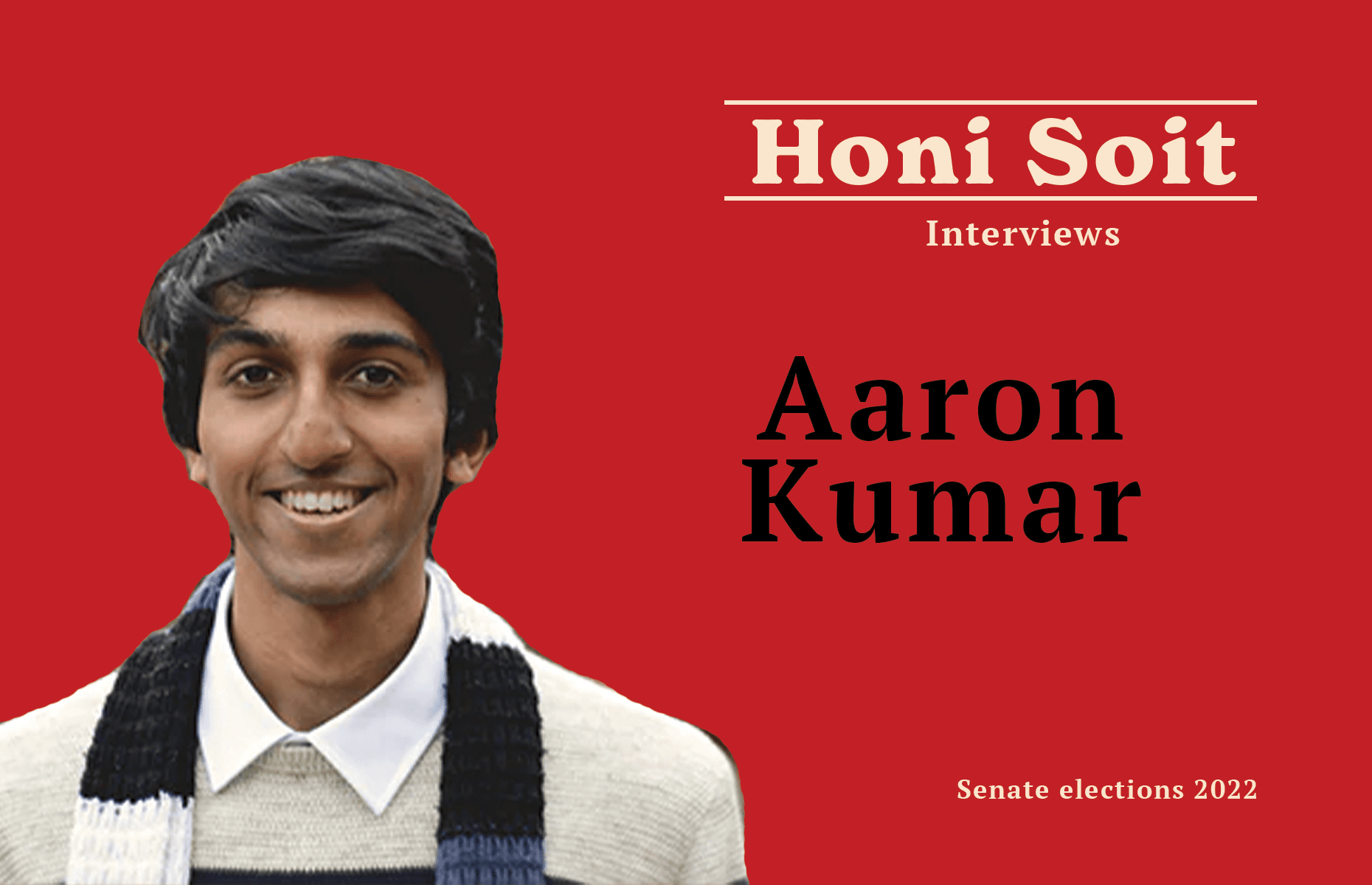Degree: Bachelor of Engineering, III
Factional affiliation: Independent
Arguably the least known of the three candidates, Aaron Kumar is a third year Engineering student positioning himself as the candidate “with the best shot at representing the left on campus”. In his additional statement to Honi, he admitted that he had no factional affiliations or support, which will present a challenge for Kumar. This appears to be Kumar’s first proper go at student elections (aside from a Facebook post campaigning for the SRC brand I N T E R P O L). While he supported his Labor MP in the most recent federal elections, he is not a member of Labor.
“I would not necessarily strictly describe myself as being limited to one leftwing federal party, but instead saw the individual policies of Michelle Rowland (diversity of media ownership and transparency) and liked them,” he said in his Honi statement.
Kumar pulled out of his scheduled Honi interview at the last minute, and therefore his institutional knowledge of the Senate could not be assessed.
However, he appears to have a firm understanding of the University’s operations, having held leadership roles across the University’s Education, Provost, External Engagement, and Operations portfolios. In particular, he highlighted his experience as an Equity Student Leader within the Office of the Pro-Vice-Chancellor (Educational Innovation) where he ran the newly established Student Equity Collective (SEC), a team of students who “engage a community that is interested in projects that promote diversity and inclusion across our underrepresented and disadvantaged cohorts”. Amongst these projects are Welcome Week social events and the development of the ‘Get Prepared’ and ‘Power Up Your Learning’ Canvas courses, which aim to “support students’ academic and social transition into study and life at the University” and “improve academic performance”. However, given the SEC’s proximity to university management, it is unclear the extent to which this collective and Kumar’s experiences have been representative of disadvantaged students’ interests.
He has also been involved in student advocacy and representation to the University, advocating for and codesigning the recently introduced E12 Professional Mentoring Program with the Office of the Pro Vice-Chancellor (Student Life). The program aims to “address the major gaps” for students from low socioeconomic backgrounds. His Honi statement also refers to his “keen interest” in the NTEU’s bargaining campaign, and his “strong advocacy” for students with disabilities, especially as a disabled student himself. In the absence of an interview, Honi was unable to clarify what this will look like in practice, given that he has not been involved in some of the more visible aspects of disability and education campaigns with the SRC.
Kumar’s policy platform features a strong focus on improving outcomes for disadvantaged students, including those from lower socioeconomic backgrounds, international students, students with a disability, and First Nations students. He cited as problems the quiet reforms to USyd’s discontinuation not to count as fail and recent HECS-HELP changes that would mean students who fail more than 50 per cent of their units lose their Commonwealth supported places, however he has not provided specifics on how he plans to address this if elected. In particular, he pointed out that the University’s allocated Higher Education Participation and Partnerships Program (HEPPP) funding was no longer going towards supporting the retention of disadvantaged students, and promised to address that.
“I do not want the University to use equity students as a funding tool. The rate of attrition among us is crazy high especially First Nations students,” Kumar said in his Honi statement.
“To me, it seems that the University is just recruiting equity students for their profit, and not willing to provide support throughout all the years of their learning,” he said.
Despite a promising policy platform that appears to address important issues based on his personal and professional experiences, Kumar is likely to struggle with garnering enough support. Kumar’s campaign strategy favours “reaching out to the main student body and listen to their concerns” over “just spamming messages to beg strangers to vote for me”, although Honi doubts that this is a winning strategy. Without any factional support, he is expected to have difficulty mounting a substantial campaign that will reach students and persuade voters to vote for him. This is compounded by the fact that Senate elections are historically less visible and have lower voter turnout than other student elections.
“Students have seen the way that the conservatives have treated the Senate position in the past two years and are not happy about it, and the only way to fix that this election is to vote in a change in ideas about representation,” Kumar said.
Voting for Student Senate Fellow elections are now open, and will close at 4pm on Tuesday, 18 October.





